Iran’s Islamic Revolution of 1979: A Beacon of Hope for the Palestinian Nation
The Islamic Revolution of Iran in 1979 emerged during a period when progressive movements and revolutionary leaders predominantly embraced the ideas of the Eastern Bloc, particularly those rooted in Marxist teachings. This inclination towards Marxism also influenced the liberation movements in Palestine, as they sought to free their nation from the clutches of the Zionist regime. Despite their valiant efforts, these liberation movements ultimately fell short of achieving their objectives. However, the Islamic revolution in Iran exerted a profound influence on the Palestinian people, causing the wane of leftist and Marxist tendencies within their militant groups. Consequently, mosques and religious leaders assumed a prominent position, harnessing their mobilization power to spark the Palestinian intifada.

The Iranians, having dismantled the stronghold of global arrogance and the Zionist regime in their nation, instilled hope within their Palestinian brethren, inspiring them to pursue the reclamation of their inalienable rights. Notably, Imam Khomeini's declaration of the last day of the holy month of Ramadan as International Quds Day stands as one of the Islamic Revolution's most historically significant expressions of support and solidarity for the Palestinian resistance.
In reference to this, the late Dr. Fathi Shaqaqi, the secretary-general and founder of the Palestinian Islamic Jihad movement, eloquently stated, "Nothing could arouse the Palestinian nation's sentiments and revive hope in their hearts as much as Imam Khomeini's revolution. With the victory of the Islamic Revolution [in Iran], we regained our senses and realized that America and Israel were not invincible at all. This awakening call revealed our ability to accomplish miracles through the inspiration of our Islamic faith. Therefore, our mujahid nation in Palestine deeply appreciates the Islamic Republic of Iran, viewing Imam Khomeini as a paragon of resilience and an eternal leader in Islamic history."
The Constitution of the Islamic Republic of Iran, driven by the goal of ensuring the prosperity and happiness of all human beings across the globe, assumes the responsibility of safeguarding the rights of oppressed Muslims worldwide. As per the principles of Islam, supporting the rights of all individuals, particularly the downtrodden, marginalized, and subjugated nations, constitutes a fundamental duty incumbent upon Muslims.
In other words, the championing of human principles and values, the pursuit of common human ideals, and the unwavering support for justice, freedom, independence, peace, and security are unequivocal teachings of Islam.
An integral principle enshrined within Iran's constitution revolves around the endorsement of liberation movements. Prior to the Islamic Revolution of Iran, such movements, particularly those rooted in religious ideologies, either did not exist or held negligible influence. Even if they garnered support from major powers, it was solely driven by self-interest rather than genuine endorsement.
However, following the Islamic Revolution in Iran, the Iranian state assumed a proactive stance in supporting these movements, establishing strong bond with them. Thus, it can be affirmed that the Axis of Resistance, galvanized by the lofty tenets propounded by Imam Khomeini, initially emerged in West Asia and Beirut, and today, under Iran's aegis and in cooperation with resistance fighters in Baghdad, Damascus, Manama, Sana'a, and Palestine, it has come to full fruition.
Today, the Palestinian question stands as one of the salient challenges confronted by the US-led global arrogance. The new generation of Palestine, far from accepting humiliation, has embraced resistance ideologies, fortified by their faith in the Almighty, and embarked upon the path of Jihad. Their determination to persist, stand tall, and confront the Zionist aggressors has metamorphosed into an unyielding doctrine. The Operation Al-Aqsa Storm, which astonished military observers, is the acme of military progress achieved by the new Palestinian generation.
On the other hand, Iran assumes a pivotal role within the resistance front, particularly during times of crisis such as wars, terrorist attacks, and uprisings. As the pulsating heart of this axis, Iran consistently supports the legitimate defense of Palestinians residing in occupied Palestinian territories while maintaining utmost respect for the independence of Palestinian groups in decision-making processes.
Recently, in response to repeated messages from the United States concerning regional developments, Iran has unambiguously stated that the resistance groups in the region act independently and are not subject to Tehran's directives regarding their decisions and strategies. It is important to note that the Operation Al-Aqsa Storm was completely conceived and executed only by Palestinian resistance forces without the involvement of Iran.
With the ongoing war and the siege of Gaza's 2.2 million civilians, indications of new fronts opening in the region have emerged. If the United States genuinely wishes to prevent the escalation of conflict, it must cease the killing of Gazans and refrain from toying with the emotions and red lines of resistance groups in the region. Iran has explicitly warned that the continued atrocities of the Zionist regime, coupled with the exacerbation of the already unabated crisis, will ignite the fury of regional nations, leading to the establishment of new fronts against both the Zionist regime and the United States. Recent military attacks against the US in Iraq, Syria, Lebanon, and Yemen serve as undeniable evidence of this potential scenario.













































